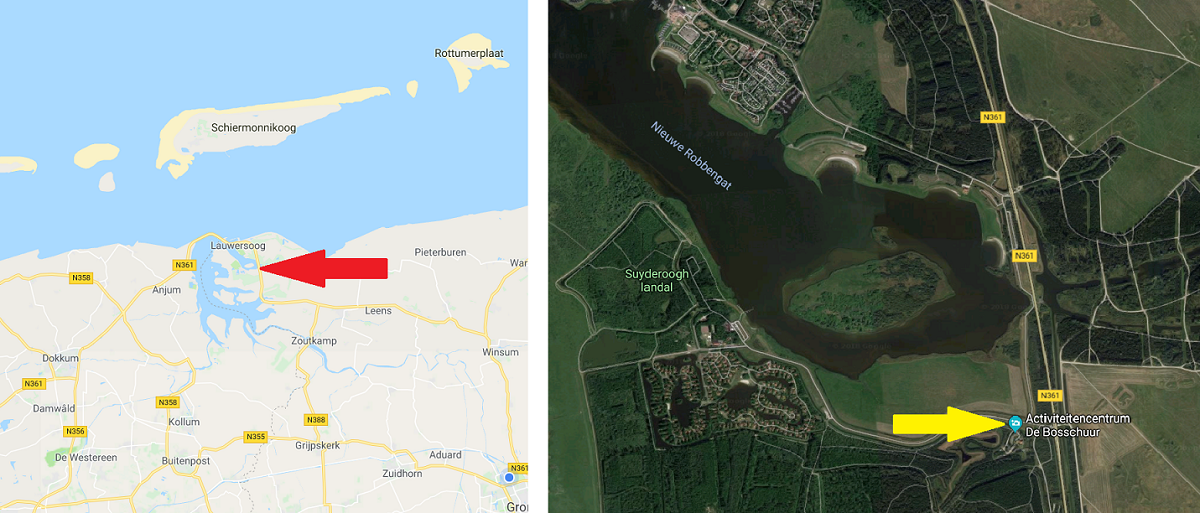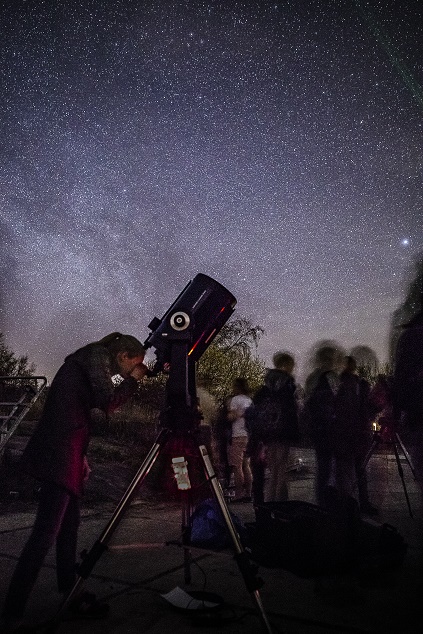UG to build new observatory in dark Lauwersmeer Region
The Kapteyn Astronomical Institute of the University of Groningen is working on a concrete plan for a new observatory in the Dark Sky Park Lauwersmeer. The observatory will be placed at the Lauwersnest Activity Centre of Staatsbosbeheer in Lauwersoog. Staatsbosbeheer is a national public body that owns and manages forests and nature areas in the Netherlands. The University aims to start operating the remote-controlled telescope in early 2020.
Very Dark
Lauwersmeer National Park was officially declared a Dark Sky Park by the International Dark-Sky Association in October 2016. A Dark Sky Park is defined as an area where nights are very dark, where the darkness is preserved and where visitors are welcome at night to experience that obscurity. The nature area Lauwersmeer, on the border of the provinces of Groningen and Friesland, is one of the last places in our country where the night gets really dark, and a clear starry sky can be seen.

Collaboration
Staatsbosbeheer invited the Kapteyn Astronomical Institute, the UG’s Astronomy department, to be a partner in the Dark Sky Park’s astronomical installations. The new observatory is one of the most important in its category. The design for the observatory and the telescope was planned by the Kapteyn Astronomical Institute with the help of students and experts in the field of telescope construction. The Kapteyn Institute received a subsidy of 25,000 euros from the Gratama Foundation to be spent on the new observatory. The UG Faculty of Science and Engineering has pledged a financial contribution for the educational work of the observatory. The collaboration of the Astronomy and Biology departments in this project strengthens ties within the University, which opens up opportunities for interdisciplinary research.
Remotely controlled
The new observatory in Lauwersmeer will be used primarily by Astronomy students for their scientific education. The telescope can be controlled remotely, and students will benefit from learning how to develop this technique and put it to use. Perhaps telescope time can also be made available to secondary school students, for astronomy lessons and school projects. The observatory will also be used for stargazing evenings and guided tours that enable visitors to experience the dark and clear sky. To this end, the observatory is additionally equipped with a viewing terrace where mobile telescopes can be set up.
Blaauw Observatory
The new observatory will complement the University’s Blaauw Observatory in the city of Groningen, which opened in 2008 on the Zernike Campus, and was also subsidized by the Gratama Foundation. Viewing conditions in the Dark Sky Park Lauwersmeer are better than in the city, so faint objects like distant galaxies will be much easier to observe. The new observatory will also increase the capacity for observation practicals, a growth made necessary by the rising number of astronomy students.

Light influences animal behaviour
Darkness at night is not only very favourable for astronomical observation, but also for animals in the wild. Artificial light confuses their orientation and natural rhythm of day and night. It can make them lose their way, lead them to start breeding too soon, or disturb their hibernation. Dark Sky Park Lauwersmeer and Staatsbosbeheer will therefore pay extra attention to the influence of light on the animals in the park, such as birds and bats.
| Last modified: | 19 January 2023 10.15 a.m. |
More news
-
03 April 2025
IMChip and MimeCure in top 10 of the national Academic Startup Competition
Prof. Tamalika Banerjee’s startup IMChip and Prof. Erik Frijlink and Dr. Luke van der Koog’s startup MimeCure have made it into the top 10 of the national Academic Startup Competition.
-
01 April 2025
NSC’s electoral reform plan may have unwanted consequences
The new voting system, proposed by minister Uitermark, could jeopardize the fundamental principle of proportional representation, says Davide Grossi, Professor of Collective Decision Making and Computation at the University of Groningen
-
01 April 2025
'Diversity leads to better science'
In addition to her biological research on ageing, Hannah Dugdale also studies disparities relating to diversity in science. Thanks to the latter, she is one of the two 2024 laureates of the Athena Award, an NWO prize for successful and inspiring...
